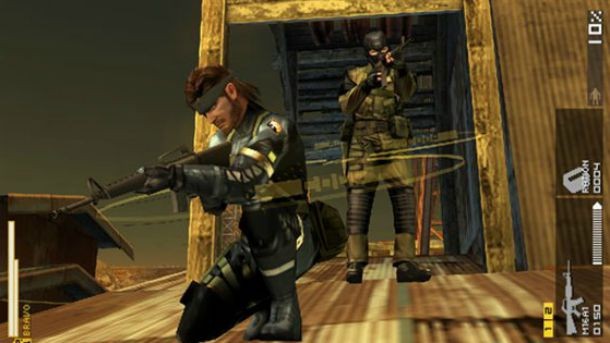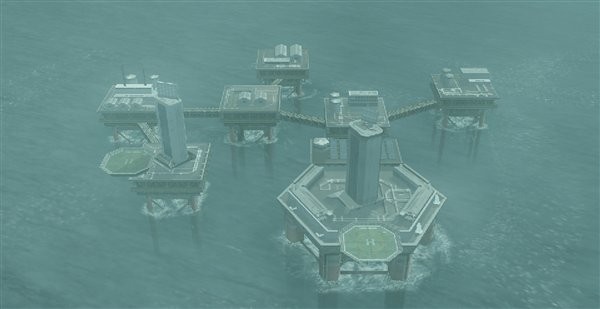Our extra-large special edition is here. Subscribe today and receive the 25% longer issue at no extra cost!
Editor Discussion – Why You Should Play Peace Walker Before Metal Gear Solid V

Metal Gear Solid V: The Phantom Pain is only about a month away, and it seems to be exploring new territory for Konami’s tactical stealth series. However, some fans may not realize that a lot of the mechanics in MGS V are iterations of concepts tested in Peace Walker.
Originally released as a PSP title (review), Peace Walker didn’t have the wider reach of previous entries, but the availability of the Metal Gear Solid HD Collection (review) makes it more accessible today. So, why should you worry about going back and playing an old Metal Gear game when a new one is on the horizon? Game Informer’s Joe Juba and Mike Futter discuss how the lessons learned from Peace Walker could be useful going into the The Phantom Pain.
Joe: So, let’s get the first and most obvious thing out of the way: The story from Peace Walker will undoubtedly be important in The Phantom Pain. We’ll avoid spoilers, but we’ve already seen examples of this in Ground Zeroes.
Mike: Absolutely, and while no one explicitly told me to play Peace Walker beforehand (this is someone telling YOU to play Peace Walker beforehand, dear readers), I’m glad I did. There are crucial plot developments that happen in that game. While you can get a quick primer in Ground Zeroes via cassette tapes, there is certainly value for experiencing things as they roll out. Additionally, it’s worth experiencing Peace Walker for the brilliant Mother Base metagame.
Joe: Yeah, building up Mother Base was one of the highlights of Peace Walker for me. There’s something incredibly satisfying about the slow and steady progression, watching your base grow from tiny to sprawling. It seems like Kojima Productions recognized that players connected with it, because the concept is returning in MGS V. As Kato mentioned after his hands-on time, the base-construction aspects of the game seem even deeper and more impactful in the new game, but getting familiar with Peace Walker’s version should give you more familiarity with how the system works.
Mike: One of the things I Ioved about it was getting pickier about which enemies I abducted using the ever-amusing Fulton recovery system. In the beginning, it was enough just to stock Mother Base with bodies. Later on, there was a satisfying amount of min-maxing that kept me entertained. Unfortunately, not all of Peace Walker’s trappings are quite as fulfilling. If you’re planning on playing and are only interested in the story, you’ll be able to skip them, though. I understand why the more difficult versions of boss battles exist in the “side ops” roster, but they simply aren’t fun.

Joe: Agreed. To your first point, I love the fact that MGS V is just going all-in on the Fulton. Instead of just recruiting soldiers, you can now nab animals, weapons, and vehicles with those hilarious air balloons. I’m looking forward to that. To your second point, yeah, players should feel free to skip any side missions they aren’t enjoying, especially those enhanced bosses. In fact, boss fights in general are a major let-down in Peace Walker, and something that I hope the team at Kojima Productions learned from when designing MGS V. The series is usually so good at providing clever encounters against memorable characters. As a warning, in Peace Walker, boss fights are just against machines without much personality. Was that an issue for you, or was it just me?
Mike: They were. In the same way boss fights felt off in Deus Ex: Human Revolution, in fact. While you can complete the mechanized boss fights that include humans in non-lethal ways, it’s simply all out combat against the AI opponents. I spent over an hour using smoke grenades and “hobby” magazines (and a single tranq dart) to take down a helicopter. It was frustrating, but decidedly “Metal Gear.” The rocket launcher-heavy fights against the AI just weren’t satisfying in the same way, but are crucial from a narrative perspective. Thankfully, most of the game falls back on bite-sized chunks of what most people love about Metal Gear.
Joe: Yeah, I suppose I should focus on the positive. After all, Peace Walker is ultimately fun and people should play it. When you aren’t fighting bosses, the experience is unmistakably Metal Gear. Methodically taking down guards, hiding in cardboard boxes, following patrol routes – it’s all familiar. However, it also feels fresh, since the mission-based approach means that you have a fun series of objectives in smaller zones, compared to the longer term approach to goals in the console installments. Judging from what I’ve see of the mission structure in MGS V, it seems like splitting the action into more digestible chunks is another lesson the team is bringing to the new game.
Mike: That’s a good move for an open world game. Giving players defined objectives not only helps keep players on track, but also reminds them that they’re actually accomplishing stuff and not just yanking guys into the sky with balloons. Even with the smart gameplay that was a byproduct of being on a portable device, I keep coming back to the story as a primary motivation for playing Peace Walker. Metal Gear Solid 3 is heralded by many as the best in the series, which makes Peace Walker that much more valuable. Without giving too much away, Big Boss is plagued by the events of that game and finds some measure of closure through the events that unfold in Costa Rica.

Joe: Yeah, though as a longtime Metal Gear fan, I don’t think Peace Walker’s story stands great on its own. However, it introduces characters that clearly play significant roles in Ground Zeroes and The Phantom Pain, so it’s definitely valuable from that perspective.
Mike: It’s an important bridge. It’s not just Ground Zeroes and The Phantom Pain it informs, but also Snake’s relationships with Zero, Kaz Miller, and The Boss. But I don’t disagree with you. As a standalone story, I’d never recommend it. It’s not a good starting point, because it relies on so much that happened before (and, as we found out, derives much of its value from future entries). I hate to use the tired gaming cliche, but this is a must-play for fans of the series. I’m kicking myself that it took me so long to get to it, but at least this way, events are fresh in my mind for The Phantom Pain.
Joe: Fans may be surprised how different it is, but that’s part of what makes it such a good primer for MGS V. While the basic stealth and gameplay are familiar, the new stuff – like the Fulton extraction, the mission structure, and the base-building elements – serves as a nice introduction to the changes that The Phantom Pain is bringing to the formula. Also, these are things that weren’t in Ground Zeroes – which only gives a preview of the basic gameplay and open-world aspects. In a lot of ways, I think Peace Walker is probably a better taste of what to expect from The Phantom Pain than its official prologue.
This feature was originally published on July 27, 2015.

Get the Game Informer Print Edition!
Explore your favorite games in premium print format, delivered to your door.
- 10 issues per year
- Only $4.80 per issue
- Full digital magazine archive access
- Since 1991






